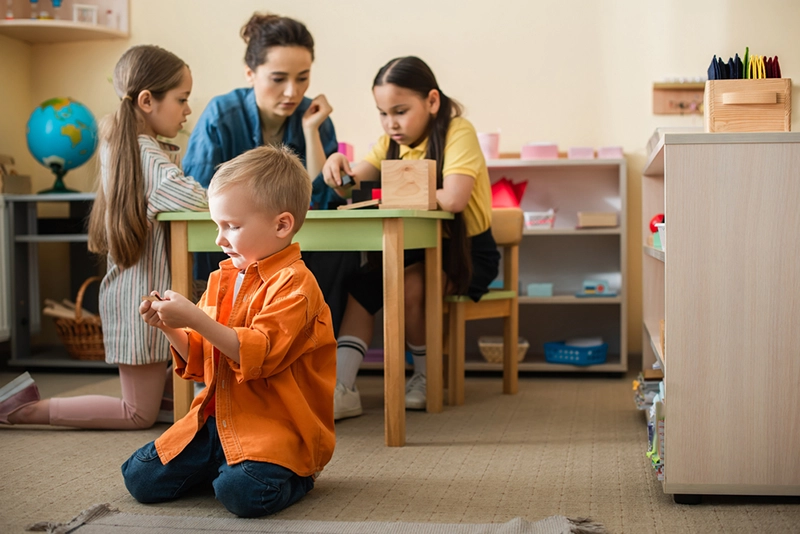Las amistades son importantes a todas las edades. A nivel personal, los amigos comparten experiencias divertidas, ofrecen diferentes perspectivas y se apoyan mutuamente en momentos difíciles. Mientras que, a nivel mundial, las Naciones Unidas afirman que las amistades tienen el poder de generar pasión por un mundo mejor y unir a las personas por el bien común.
Cuando se trata de niños, el vínculo social es una parte importante de su desarrollo. Mientras que los niños pequeños hacen amigos por primera vez, los preescolares están construyendo relaciones sólidas, así que veamos algunas sugerencias para apoyar las amistades de tu hijo pequeño.
Niños pequeños: cómo desarrollar habilidades de amistad y organizar citas de juego
Como todas las personas, algunos niños pequeños son sociables, mientras que otros prefieren la compañía de menos compañeros de juego. Sea cual sea su temperamento, los niños pequeños no nacen sabiendo compartir, esperar turnos y resolver problemas, por lo que necesitan tu ayuda para aprender y practicar estas habilidades de amistad.
Al jugar con ellos y organizar encuentros para jugar, tu pequeño aprenderá a jugar bien, lo que a su vez sienta las bases para futuras habilidades sociales. Esto es lo que puedes hacer:
- Pasar tiempo jugando juntos
Además de ser una experiencia divertida para fortalecer los vínculos, el juego entre padres e hijos ofrece oportunidades para enseñarle a tu pequeño cómo hacer cosas, ya sea compartiendo un trozo de plastilina o turnándose para patear una pelota. Los juguetes pueden usarse para modelar la amistad y los niños pequeños responden bien a los elogios, así que no olvides decirles cosas como "Gracias por compartir con mamá" cuando jueguen bien.
- Organizar citas para jugar
El juego es la forma en que los niños pequeños aprenden, y cuanto más jueguen con otros, más probabilidades tendrán de aprender a jugar bien.
Antes de la cita de juegos, guarda los juguetes especiales y deja afuera muchos juguetes y juegos que les guste compartir. En lugar de organizar juegos por turnos, planifica actividades en conjunto como jugar con arena, construir con bloques y pintar, y céntrate en un ambiente relajado, en lugar de actividades demasiado estructuradas.
Una vez que comience la cita para jugar, la Red de Crianza Infantil recomienda que el tiempo de juego sea breve, de unos 45 minutos a una hora, para que termine con broche de oro. Siéntese con los niños un rato cuando empiecen a jugar y luego aléjese cuando estén jugando juntos y felices. Manténgase a la vista y al alcance del oído, y si percibe tensión entre los niños, intervenga para calmar la situación.
Si hay una disputa por un juguete, puedes distraerlo diciendo: "Juguemos con estos peluches. Ella, te quedas con el marrón. Lucy, te quedas con el blanco", antes de alejarte. A veces tendrás que asegurarle a tu hijo que sus juguetes siguen siendo suyos. Si tu hijo pequeño se muestra agresivo porque no se sale con la suya, es importante decirle con firmeza: "¡Basta!" y decirle qué quieres que haga.
Entre los uno y los dos años, tu pequeño probablemente jugará con los hijos de familiares, amigos y otros padres, pero a medida que crece, puede decir mejor lo que piensa y te hará saber con quién le gusta socializar, lo cual siempre es bueno saber.

Niños en edad preescolar: cómo hacen amigos y el apoyo que puedes ofrecerles
Al igual que ocurre con los niños pequeños, algunos niños en edad preescolar son más sociables que otros, y Raising Children Network afirma: "Existe un amplio rango de lo normal cuando se trata de que los niños en edad preescolar hagan amigos".
Dicho esto, a la edad de tres años, muchos niños pasan tiempo regularmente con otros niños, ya sea en la guardería o en el grupo de juego, y pueden:
- Saber quiénes son sus amigos y poder nombrarlos.
- Busquen a sus amigos cuando lleguen a la guardería.
- Juega solo con sus amigos
- Pide tener una cita para jugar con amigos específicos
- No tienen amigos que puedan nombrar, ¡pero les encantaría tener algunos! Nota: a los cuatro años, la mayoría de los niños en edad preescolar pueden diferenciar entre "mi amigo" y otros compañeros.
Al igual que los niños pequeños, los preescolares están desarrollando las habilidades de amistad que necesitan ahora y en el futuro. Además de practicar el compartir y el respeto por turnos, también están aprendiendo a cooperar, escuchar y negociar.
Debes fomentar estas habilidades en la vida familiar y, para ayudar a tu hijo en edad preescolar a hacer amigos durante el juego, es una gran idea organizar citas de juego con otros niños cuya compañía disfrute.
El día de la cita de juegos, recuerda:

- Guarde los juguetes especiales de su niño en edad preescolar antes de que llegue su amigo para evitar desacuerdos más adelante.
- Ayude a su hijo a jugar bien Ofreciéndoles a los niños diferentes opciones de juego y elogiándolos cuando deciden realizar una actividad juntos.
- Manténgase en estrecha proximidad física y esté atento a los procedimientos. Esto le brinda tranquilidad a su hijo en edad preescolar y le permite intervenir fácilmente si hay una discusión o un juego "demasiado brusco".
- Ayude a su hijo si tiene dificultades para jugar. La Red de Crianza Infantil afirma que jugar solo no es preocupante y que los niños suelen jugar juntos mientras aprenden a jugar juntos. Sin embargo, si su hijo en edad preescolar no sabe cómo participar, a menudo se le excluye o no quiere jugar con otros, puede:
- Hable sobre las formas en que podrían participar y luego invite a otros niños a unirse (por ejemplo, '¿Puedes ayudarme a construir esta torre? ¿Puedes ver si alguien más nos ayuda a hacerla realmente alta?')
- Anime a su hijo en edad preescolar a observar lo que hacen los demás niños, para que entienda cómo participar (por ejemplo, '¿Qué está haciendo Thomas con esa caja de disfraces? ¿Crees que está jugando a los superhéroes? ¿Crees que necesita un Batman?')
- Establezca un límite de tiempo para la cita de juego Para que los niños no estén demasiado cansados al final y tengan ganas de volver a jugar juntos.

Algunos niños pequeños son muy sociables y otros no tanto, pero todos necesitan desarrollar las habilidades de amistad que les acompañarán toda la vida. Al practicar estas habilidades juntos, organizar citas para jugar y resolver problemas durante el proceso, puede ayudar a su hijo a aprender a jugar bien y a ser un buen amigo.



